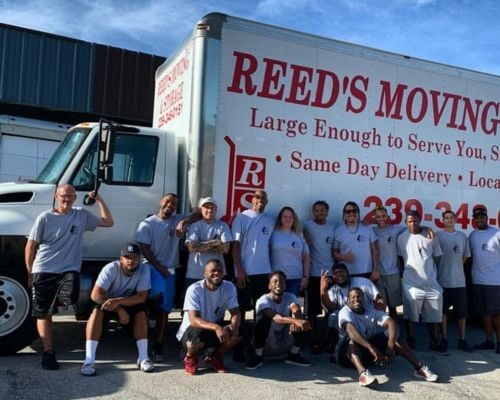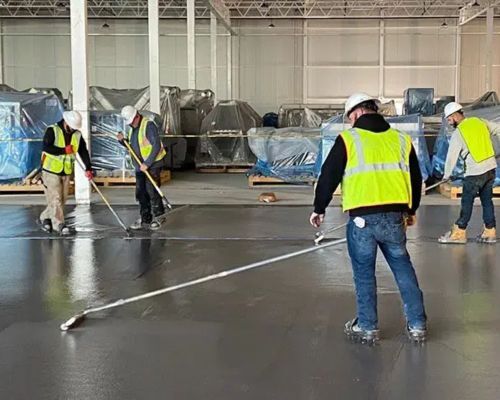Get started by answering a few simple questions.

The SBA 7(a) loan is a great fit if you’re:
- Buying a small business
-
Expanding your current business or opening new location
-
Needing working capital to manage day-to-day expense
-
Buying out a partner or taking over a family business
-
Financing franchise acquisition or growth
You’ve got a vision. We’ll help you get there, step by step.
We know applying for an SBA 7(a) business loan can feel overwhelming. That’s why we walk with you through every step offering expert guidance, honest feedback, and constant communication. You’ll never wonder where things stand or what comes next.
-
Step 1: Tell Us Where You're Headed
Open or Close
Start by sharing your business goals and what you're hoping to achieve. Whether you're buying, expanding, or just getting started. This short form helps us connect you with the right specialist.
✔ Quick and simple to complete
✔ No credit check
✔ Helps us understand what success looks like for you -
Step 2: Meet Your Loan Specialist
Open or Close
You’ll talk one-on-one with a lending expert who’s here to support you, not sell to you. We’ll listen, ask questions, and start mapping out a path that fits your timeline, your experience, and your vision.
✔ Personal guidance from someone who knows SBA loans inside and out
✔ No pressure, no confusion
✔ You’ll leave knowing exactly what to expect -
Step 3: See If You’re Ready to Move Forward
Open or Close
Together, we’ll look at the essentials to make sure you're in a strong position to move ahead. If something’s missing, we’ll help you prepare.
✔ Review your credit, experience, and ownership background
✔ Talk through available cash or capital
✔ Learn what strengths you already have—and what we can help strengthen -
Step 4: Build Your Business Profile
Open or Close
We’ll help you gather the details needed to tell your business’s story. You’ll never have to guess what to send. We’ll walk you through it all.
✔ Business plan and projections (don’t worry, we can help!)
✔ Financials, tax returns, or purchase documents
✔ Clarity around what lenders need and why -
Step 5: Submit with Confidence
Open or Close
Now it’s time to officially apply. But you’re not doing it alone. We’ll help package everything with you, submit it, and keep you updated every step of the way.
✔ We help the heavy lifting
✔ Constant communication. No black holes
✔ You'll always know where things stand
Let’s talk about how an SBA 7(a) loan could work for you.
We’re here when you are, and we’ll be with you the whole way.

What you’ll typically need to qualify for an SBA 7(a) business loan.
Thinking about getting an SBA 7(a) business loan? If you're considering an SBA loan through First Bank of the Lake, here are the common minimum requirements we’ll look at during the application process:
You Must Meet SBA Eligibility
To qualify, you'll need to meet the SBA’s standard requirements. This includes operating a for-profit business located in the U.S., being a U.S. citizen or lawful permanent resident, and showing responsible credit and financial history.
Ready to Invest at Least 10%
Most SBA 7(a) loans require an equity injection of 10% or more. This can come from your own funds or, in some cases, include a portion of seller financing if it meets SBA terms.
A Credit Score of 680 or Higher
We typically look for a personal credit score of 680 or above. This helps us assess your overall financial picture and repayment ability.
Strong Historical Financials
The business should have at least three years of financial records or tax returns. We like to see stable or growing revenue and positive cash flow, as this speaks to the health and viability of the business.
Some of the best US small businesses partner with us.
Read their stories and see how First Bank of the Lake turned business goals into reality.
Proven Results Backed by Industry-Leading Expertise
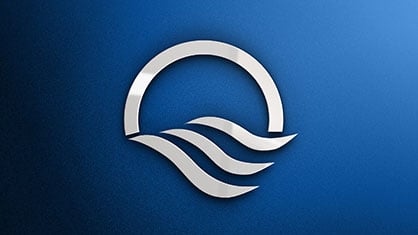
At First Bank of the Lake, lending decisions are driven by our team of banking professionals who understand your business. We recruit top talent who apply their extraordinary experience and depth of knowledge to providing first-class service, trusted advice, and the best financial products. Their dedication and commitment are truly inspiring and are the spark that ignites innovation, competition, and expansion. We employ our creativity, understanding, experience and expertise to build the right solutions for you.
First Bank of the Lake understand how essential growing businesses are to fueling local economies and that not all businesses qualify for conventional business loans. That’s why we offer government-guaranteed Small Business Administration (SBA) 7a and 504 loans.
Funded Over
+$1.9B
In SBA Loans Since 2020
Funded Over
2,000
SBA Loans Since 2020
Ranked
Top 5
SBA Franchise Lender*
Funded Over
+$600M
In Franchise Loans Since 2020
SBA 7(a) Loans: Frequently Asked Questions
An SBA 7(a) loan is the primary method used by the Small Business Administration (SBA) to provide funding for small businesses in the United States. Unlike SBA 504 loans, it offers greater flexibility in how the funds can be used, covering a wide variety of business purposes such as equipment purchases, real estate acquisition, working capital, and other operating expenses. The SBA does not lend money directly but guarantees a portion of the loan (85% for loans up to $150,000 and 75% for loans over $150,000), which encourages lenders to provide funding.
In contrast, SBA 504 loans are specifically designed for the purchase of large-scale capital assets like real estate and equipment, requiring a Certified Development Corporation (CDC). While 7(a) loans have a maximum of $5 million, 504 loans can go up to $15 million.
SBA 7(a) loans are incredibly versatile and can be used for a broad spectrum of business-related needs. These include acquiring or improving real estate (buildings, unimproved land, renovations, new construction, tenant improvements), purchasing new or used equipment, buying an existing business, expanding current operations, updating technology (software and hardware), refinancing existing business debt, onboarding and training new staff, purchasing fixtures and furnishings, and providing working capital. A significant advantage is the ability to combine multiple funding needs into a single, often lower-cost, lending package.
To qualify for an SBA 7(a) loan, a business must meet several key requirements. It must be located in the United States, meet the SBA's definition of a small business, operate legally, and be a for-profit entity. Crucially, the business must demonstrate the ability to repay the loan and show that funding cannot be obtained on reasonable terms from other lenders. Both the business and its owners must have an acceptable credit history or score.
Certain businesses are ineligible, including not-for-profit organizations, lending companies, most passive businesses, companies deriving more than one-third of their annual gross revenues from legal gambling, businesses engaged in illegal or speculative activities (like oil wildcatting), life insurance companies, those involved in political or lobbying activities, businesses that have previously defaulted on a U.S. government loan, those producing or selling pornography, and businesses using pyramid sales distribution plans. Additionally, tangible net worth (including affiliates) should not exceed $15 million, and average net income (including affiliates) must be under $5 million after federal income taxes for the two fiscal years prior to the application.
Pros of 7(a) Loans:
- Easier to qualify than some traditional loans: The SBA guarantee makes lenders more willing to approve loans, especially for businesses with repayment ability but insufficient collateral.
- Low interest rates: Interest rates are often lower than those available in the commercial lending marketplace.
- Longer repayment terms: Loans offer superior flexibility with repayment terms up to 25 years for real estate and 10 years for other uses.
Cons of 7(a) Loans:
- Equity requirements: If collateral is insufficient, the SBA may require the lender to use available equity in the personal real estate of business owners with 20% or more ownership, as well as any guarantors.
- Requires good credit score: Businesses with past credit difficulties may find it challenging to qualify.
- Approval times can be lengthy: Unless working with an SBA Preferred Lender, approval and disbursement times can be prolonged.
SBA 7(a) loan interest rates are competitive and can be either fixed-rate or variable-rate options. The SBA sets maximum allowable rates, which currently range from Prime plus 3% to Prime plus 6.5%, depending on the loan amount (smaller loans typically have higher rates). Lenders negotiate the specific rate with the borrower, considering current SBA guidelines and the risk associated with the loan.
Key terms include a maximum borrowing amount of $5 million. Repayment terms generally do not exceed 10 years, though real estate loans can extend up to 25 years. A guarantee fee, set by the lender using SBA guidelines, will be assessed. Balloon payments are not allowed, and a personal guarantee from all owners with a stake of more than 20 percent is required. Lenders may charge reasonable fees for packaging and other services but cannot double-charge for the same service, and borrowers are not required to obtain or pay for unwanted services.
There are several types of SBA 7(a) loans to cater to various business needs:
- 7(a) Standard Loans: These are the most common, offering 85% guarantees for loans of $150,000 or less and 75% for loans over $150,000 (up to $5 million). They allow for a wide range of eligible uses.
- 7(a) Small Loans: These are for amounts of $500,000 and under, with the same guarantee percentages as standard 7(a) loans. The requirements may be more streamlined.
- 7(a) Express Loans: These have a maximum loan amount of $500,000 with a 50% SBA guarantee. They may offer revolving lines of credit for up to five years within a 10-year overall duration, and lenders decide on borrower qualification.
Other programs mentioned include the Export Working Capital Program, 7(a) International Loans, and CAPlines. Pilot programs like Community Advantage loans, which assisted businesses in underserved markets, expired in September 2023.
An SBA Preferred Lender, like First Bank of the Lake, is a financial institution that has been thoroughly vetted by the Small Business Administration. They have a proven track record of success and reliability in approving and servicing SBA loans. Due to this demonstrated dependability, the SBA grants Preferred Lenders the authority to make lending decisions on its behalf.
Working with an SBA Preferred Lender offers significant benefits, primarily streamlining the application and approval process. This drastically reduces the time it takes from application submission to the disbursement of funds for approved loans. For example, First Bank of the Lake can approve loans under $150,000 in as little as 7 business days. This expedited process can be crucial for small businesses needing timely access to capital. Preferred Lenders also often provide more guidance and support throughout the entire loan lifecycle.
The process of applying for an SBA 7(a) loan involves several key steps. First, borrowers should find qualified SBA 7(a) lenders. They will then need to submit an application (SBA Form 1919) along with supporting paperwork verifying income, business operations, and other financial aspects. The lender will assess if the borrower meets the minimum SBA 7(a) loan requirements and will work to determine needs and qualifications, setting the interest rate according to SBA guidelines. Once approved, the lender processes funding and disbursement.
To increase the chance of success, borrowers should:
- Gather paperwork in advance: Ensure all company documentation is in order.
- Clean up credit report: A healthy credit score is vital; address any errors or problems.
- Reduce debt-to-income ratio: Paying down existing debt can impress lenders.
- Build a better business plan: A clear, appealing business plan can be a strong asset.
- Update financial statements: Ensure financials are current and accurate.
- Select the right lender: Choose a lender that offers guidance and support, ideally an SBA Preferred Lender for faster processing.
- Monitor the prime rate: As interest rates are based on the prime rate, keeping an eye on fluctuations can help secure better rates.
- Determine down payment size: Have at least 10% of the needed amount, especially for major acquisitions or start-ups.
- Specify fund usage: Clearly detail what the loan funds will be used for.
Do you have questions about how the SBA 7(a) business loan program works?
Cut through the confusion with our free 28-page guide.
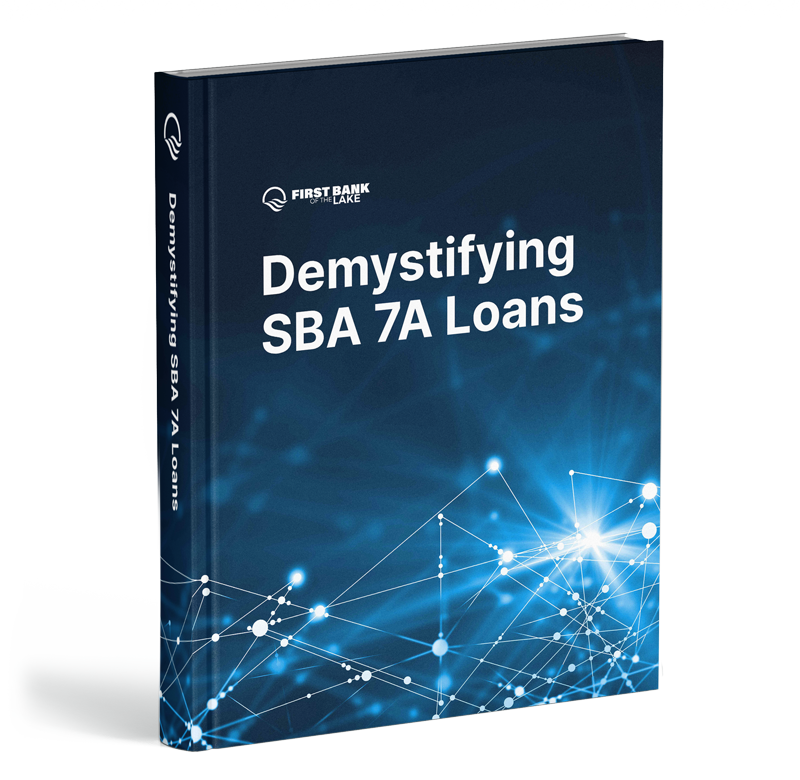
Download your free copy.
All loans are subject to credit approval. Restrictions and limitations may apply. First Bank of the Lake does not provide tax, legal or investment advice. All decisions concerning these matters should be made in conjunction with your professional advisors.
*Top 1% of SBA 7(a) lenders by approval amount during SBA fiscal year 2023. Top 5 SBA franchise lender by approval count during SBA fiscal years 2024 and 2023.
Approved to offer SBA loan products under SBA's Preferred lenders Program.



